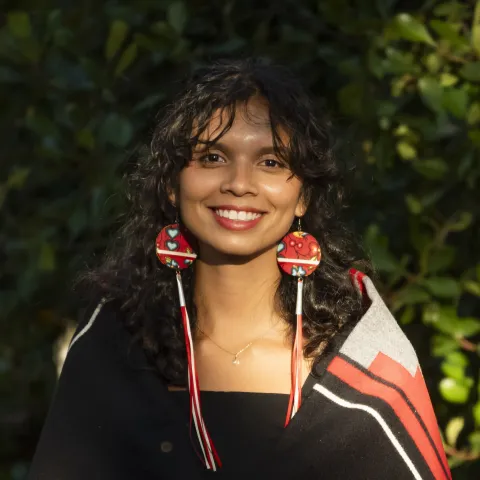
Aryanna Marie Chartrand

During the final year of my BA in Early Childhood Care and Education (ECCE) from Capilano University in British Columbia, Canada, I knew that my educational journey was far from over. While completing my undergraduate studies I worked as an Educational Assistant in a local elementary school, a casual early childhood educator (ECE), served as a Vice-President for my student union two years running, and began picking up short term research contracts for ECCE-related non-profit organizations in the province.
My time in student politics highlighted the complexities of policy at the post-secondary level, but I made many connections to my work and advocacy as an ECE. Pulling at this thread of the political nature of education, I was curious about how policy responded to the project of reconciliation in Canada. Coming from a program that focused on localized context, I was curious about how other countries were responding to legacies of colonization and how (if) there were actions being taken to address these inequities.
I applied exclusively to domestic programs in Canada, with the exception of one. When I applied to Stanford, I thought of it as an idealistic, one in a million chance and did not consider it a serious option. Once I received acceptance letters from all the programs I applied to, I had to start thinking deeply about what I was hoping to learn, contribute, and experience from my graduate studies.
The small size of the ICE / IEPA cohort was one of the biggest draws to the program. Throughout my undergraduate studies, I was never in a class larger than 35 students. Once you experience the benefits of small class sizes and the opportunity to build relationships with faculty and other students, it is difficult to choose otherwise. In the ICE / IEPA program, was no different. A small cohort allowed us to engage deeply with each other’s research interests. As a result, the feedback we were able to exchange was exceptionally helpful. As we continued to become close as peers, scholars, and educators, our feedback and questions really pushed to improve our collective research to its best. While it may seem daunting to take so many courses on top of writing a publishable MA thesis, the structure of the program strikes the delicate balance of being supportive but not restricting.
The flexibility of the program and course selection are also worth mentioning. I had come to Stanford with an existing research interest and a capstone project I was hoping to build on from my undergraduate studies and expand with my MA thesis. Choosing courses that were connected to my research interests and specifically designed to sharpen certain research skills became invaluable throughout the year. I learned from talented researchers how to interview, code, and write research proposals. But an unexpected, if not the most valuable, skill I learned (especially as a qualitative researcher) was how to understand, break down, and critically analyze all types of research studies. Despite not being interested in quantitative research, I learned how to understand the language, equations, graphs, and decipher tables that had previously been incomprehensible.
While writing my thesis at Stanford, I was also able to present at several conferences. Flying across Canada to a national education conference to present my emerging research was an incredible experience. I was able to present alongside former instructors, and names of scholars I knew from studying their work in my undergraduate studies and have them engage with my work. The encouragement and support from the GSE to share my research was helpful in laying down the foundation for my transition out of graduate school and back to Canada.
Now that I have made the transition from Stanford student to Stanford Alumni, I am able to reflect on how much impact one year can have on a professional, academic, and personal journey. I have recently started as an Instructor at Capilano University teaching courses on child development and have been selected to sit on the board of directors for the Coalition of Child Care Advocates of BC, a non-profit organization working towards high-quality and accessible ECE and improving wages for educators. I continue to build on my research skills as a contract researcher and consultant in education, and am hoping to strengthen my skills as a policy analyst. I am thankful for all the opportunities this program has opened for me and hope that you consider it for yourself!
